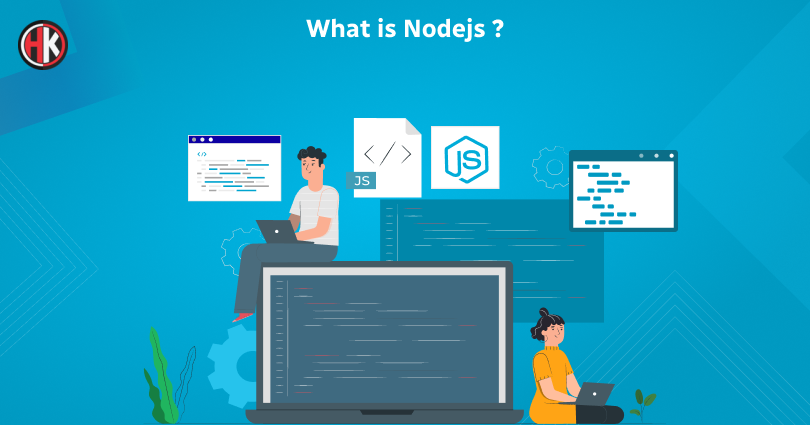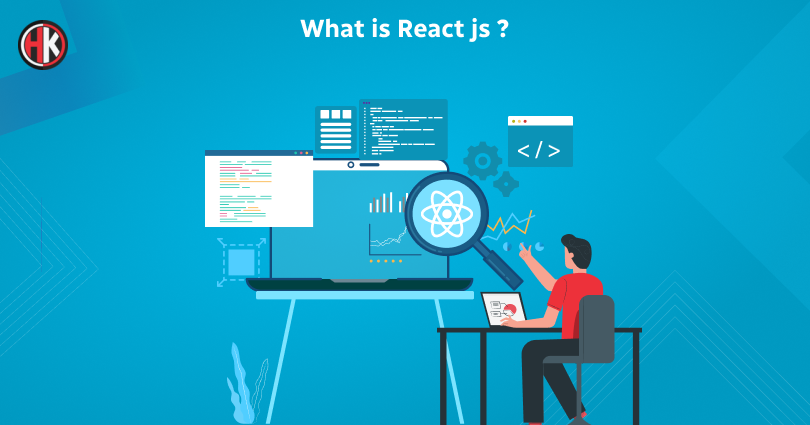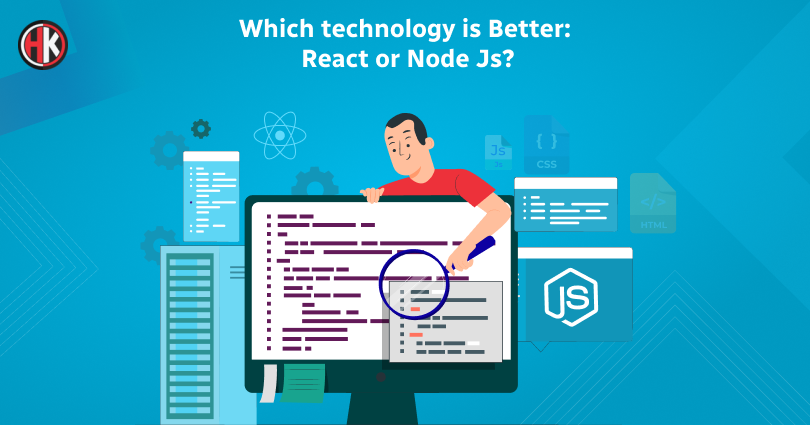
With the advancement of technology, there are so many new technical terms that people don’t actually understand the concept behind them. “Node.js” and “React.js” are two such words. The names suggest something difficult, but there isn’t any complexity between them.
Are you planning to create a web application that has a fantastic User Interface and engages and draws in a growing number of users? If so, you could be asking yourself all the time, “Which technology should I use for web development? New technologies are created daily, and existing ones are upgraded.
Choosing the next framework is crucial since it is difficult to incorporate all of these technologies. Both React.js and Node.js are really innovative technology for creating flexible applications.
Which framework, however, is more potent for creating a feature-rich, adaptable online application with an interactive user interface? if you’re torn between React.js vs Node.js? You may use this blog to determine which is best for web development.
Table of Contents
What is Node.js?
Node.js is used as an open-source, cross-platform runtime environment for JavaScript. We utilize this to run the server-side apps. It is used to create I/O-intensive applications like video streaming websites, online chat programs, and many more.
Both newly founded start-ups and several established tech-based organizations use the Node.js framework internally.

Every time a client uses the client side of an application to request anything, the request is first sent to the server, where it is processed or calculated in order to validate the client-side request. Basically, this Node.js JavaScript framework is utilized for all of these computations and processing.
You May Also Read our New Blog Article:- How to Build A Progressive Web Application in 2023
Advantages of Using Node.js for Web Development

Multi-Tasking
One of the most unique features of node.js is multitasking, This feature not only helps in getting better results but also saves a lot of time. With the help of its unique structure, the overall performance is greatly enhanced.
Scalability
The cluster module is only one of the many capabilities that cutting-edge technology offers. Additionally, Node.js employs a non-blocking event-loop structure that offers exceptional scalability and enables the server to process requests immediately.
Cost-effective
Developers can build server-side JavaScript code using Node.js, which makes it incredibly simple to write code for both the front-end and the back-end which helps to make it more cost-effective.
Improves Efficiency
Node.js provides a non-blocking asynchronous design without adding extra threads by using fewer resources thanks to its single-threaded event-loop paradigm. As a result, your application will be more responsive as it can handle several concurrent users.
Decreases time to market of application
Because Node.js is lightweight, developers may increase the rate of development as a whole. Additionally, it also helps acquire the flexibility to meet specific requirements
Node.js is simple to adapt and extend for businesses that are expanding quickly. By utilizing the built-in API for creating HTTP and DNS servers and JSON, a data format that makes data flow between clients and web servers incredibly simple, Node.js may be expanded.
Quick Caching Shortens Loading Time
With the help of its caching module, Node.js has made it simple for developers to decrease task workload and code re-execution. As a result, each request made to the initial module of your web application is cached in in-app memory. In this method, your users may get the web pages in a matter of microseconds without having to wait too long.
Develops Cross-Platform Applications
Using Node.js to build cross-platform real-time web apps enables your development team to create native desktop applications without requiring expert-level proficiency in languages like Objective-C, C#, or any other language.
The Google Chrome Developer Tools also provide additional tools that your Node Js developers may use to build, debug, and create code without any restrictions.
What is React.js
React is a front-end javascript library for building user interfaces and their components that is free and open-source. It’s also referred to as React or React.js. Meta and a number of individual programmers and companies keep it updated.
With frameworks like Next.js, React.js is the foundation for single-page, mobile, or server-rendered apps.

Read More:- Tips to Hire Dedicated Front-End Developers for your Next project
Advantages of Using React Js

Interactive
React.js is really simple to use and gives any UI layout interactive functionality. Additionally, it makes it possible for reactJs developers to quickly and accurately create apps, saving both customers’ and developers’ time.
High-Performance
The V8 Javascript, that is renowned for its quick and effective performance, serves as the foundation for Node.js.
Support for Components
The perfect combination of HTML and JavaScript is React.js. The document object model is a significant data collection that can be easily managed using HTML elements and JS codes.
During this time, React.js acts as a middleman, representing the DOM and determining which component changes are required to achieve the desired effects.
SEO-friendly
React JS was published following Facebook’s thorough analysis and development. It distinguishes itself from the competition and gives designers the ability to produce fantastic, search-engine-optimized user experiences for all browsers and engines.
Scalability:
React.js is designed to handle a large number of concurrent connections, making it ideal for building scalable network applications. It can handle many requests at once without slowing down or crashing.
Read More:- UI and UX: What are the Differences and Similarities
Node.js vs React.js: Side-by-Side Comparison

| Components | Node.js | React js |
| Backend vs Frontend | It is a framework used for backend development to create server-side applications | React.js is used to develop user interfaces such as dynamic inputs and buttons which is used for front-end. |
| MVC Framework | Node.js supports the MVC framework. MVC is a software design pattern that separates the application’s data (model), presentation (view), and control logic (controller) into separate components. | React.js also supports it but the design is more complex and can be challenging to follow the conventional method |
| Request Handling | Node.js manages requests from the browser, handles browser authentication, calls to databases, etc. | React.js manages API queries and in-browser data processing |
| Real-time Data | Node.js is designed to manage real-time data streaming. | Typically used for real-time data updates such as polling and streaming. |
| Language | Node.js only uses JavaScript Language | JavaScript and JSX language are both utilized on React.js |
| DOM | There is no use for the DOM (Document Object Model) concept. | The use of the virtual DOM (Document Object Model) here speeds things up. |
| Microservices | Writing microservices is simpler here | Writing microservices could be difficult in React.js |
Read More:-React Native vs Flutter: Which One is Better for Mobile App Development
Factors to Consider While Choosing between Node.js and React.js
Here are some factors to consider when choosing between Node.js and React.js
Project Requirements:
Node.js is primarily used for server-side development while React.js is used for client-side development. Therefore, the project requirements need to be considered before choosing between Node.js and React.js
Scalability:
Node.js is highly scalable and can handle a large number of concurrent users. React.js, on the other hand, is more suitable for building single-page applications and may not be as scalable as Node.js.
Development Speed:
Node.js is known for its fast development speed due to its non-blocking I/O model, which allows for quick response times. React.js also has a fast development speed as it is based on a component-based architecture.
Community Support:
Both Node.js and React.js have strong communities that provide support, plugins, and libraries. However, Node.js has a larger community, which can be an advantage for business owners looking for extensive support.
Performance:
Node.js is known for its high performance and low latency, which makes it ideal for building real-time applications. React.js also offers excellent performance, but it is more focused on the user interface.
Integration:
Node.js can integrate with many other tools and frameworks, making it highly versatile. React.js is designed to work with other libraries and frameworks, such as Redux, which can make it easier to integrate into existing projects.
Maintenance
Both Node.js and React.js require regular maintenance and updates to ensure optimal performance. However, Node.js may require more maintenance due to its complexity.
Read More:-Django Vs Node.js: Which One is Better for Web Development
Which Technology is Better: Node.js or React.js?

The choice between Node.js and React.js ultimately depends on the specific needs of your project. If you need to build a scalable network application, Node.js may be the better choice, while if you need to build complex user interfaces React.js may be the better choice. Ultimately, it is important to carefully consider your project requirements and choose the technology that best fits your needs.
Conclusion
In this digital age, there are many options when it comes to programming, which could also lead to confusion. React.js and Node.js are two of them, and both of them have many similarities but are different in their own way.
Node.js manages requests from the browser, handles browser authentication, makes calls to databases, etc. Whereas React.js manages API queries and in-browser data processing. This is one of the major differences between the two technologies. Each one has advantages and disadvantages.

Husain Saify
Founder & CEO
Hey, I am Husain Saify, the Founder and CEO of Hackerkernel. I like to share some valuable information about Industry. You can also Reach Out to me On Linkedin.hello@hackerkernel.com




